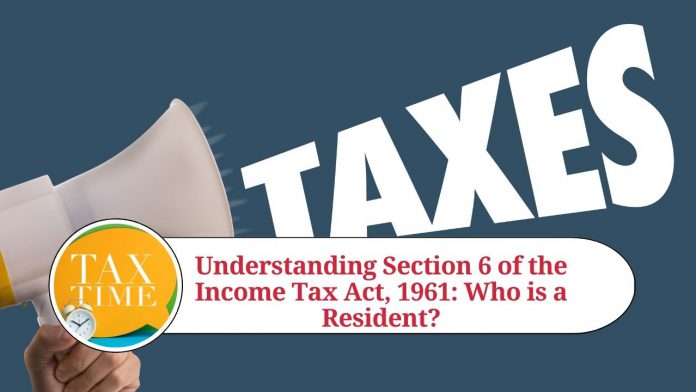Understanding Section 6 of the Income Tax Act, 1961: Who is a Resident?
Section 6 of the Income Tax Act, 1961, is one of the most crucial provisions that defines who is considered a resident in India for the purpose of taxation. The section is divided into two parts – Section 6(1) deals with individuals, while Section 6(2) pertains to companies. In this blog, we will discuss the provisions of Section 6(1) in detail, along with its implications.
Headline 1: Definition of Resident
According to Section 6(1) of the Income Tax Act, an individual is said to be a resident in India if he or she satisfies any of the following conditions: • If the individual has stayed in India for at least 182 days in the previous financial year, or • If the individual has stayed in India for at least 60 days in the previous financial year, and for at least 365 days in the preceding four financial years.
Headline 2: Conditions for Non-Resident
On the other hand, an individual who does not satisfy any of the above conditions is considered a non-resident. It is important to note that an individual who is a non-resident in India for a particular financial year can still be taxed on income that arises or is received in India during that year.
Headline 3: Implications of Being a Resident
If an individual is a resident in India for a particular financial year, his or her global income is taxable in India. This means that any income earned by the individual outside India, such as salary, interest, dividends, capital gains, etc., is also taxable in India. However, if the individual is a non-resident, only the income earned or received in India is taxable.
Headline 4: Different Types of Residents
Section 6(1) of the Income Tax Act further classifies residents into two categories – Resident and Ordinarily Resident (ROR) and Resident but Not Ordinarily Resident (RNOR). An individual is said to be an ROR if he or she satisfies both of the following conditions: • Has been a resident in India for at least two out of the ten previous financial years, and • Has stayed in India for at least 730 days in the preceding seven financial years.
Headline 5: Resident But Not Ordinarily Resident
An individual who is a resident but does not satisfy both the above conditions is considered an RNOR. An RNOR is entitled to certain tax benefits, such as exemption from tax on foreign income and foreign assets for a certain period, subject to certain conditions.
Conclusion:
Section 6 of the Income Tax Act is a crucial provision that defines who is considered a resident in India for taxation purposes. Understanding the provisions of this section is important for taxpayers, as it can have significant implications on their tax liability. As such, it is recommended that individuals seek the advice of a tax expert to ensure compliance with the provisions of the Income Tax Act.
Other Related Blogs: Section 144B Income Tax Act
Frequently Asked Questions (FAQs)
Q.1 What is Section 6 of the Income Tax Act, 1961?
Section 6 of the Income Tax Act, 1961 defines who is considered a resident in India for the purpose of taxation. The section is divided into two parts – Section 6(1) deals with individuals, while Section 6(2) pertains to companies.
Q.2 Who is considered a resident in India for taxation purposes?
An individual is said to be a resident in India if he or she satisfies any of the following conditions: • If the individual has stayed in India for at least 182 days in the previous financial year, or • If the individual has stayed in India for at least 60 days in the previous financial year, and for at least 365 days in the preceding four financial years.
Q.3 What is the difference between a resident and a non-resident for taxation purposes?
If an individual is a resident in India for a particular financial year, his or her global income is taxable in India. On the other hand, if the individual is a non-resident, only the income earned or received in India is taxable.
Q.4 Can a non-resident be taxed in India?
Yes, a non-resident can be taxed in India on income that arises or is received in India during a particular financial year.
Q.5 What is the difference between a Resident and Ordinarily Resident (ROR) and a Resident but Not Ordinarily Resident (RNOR)?
An individual is said to be an ROR if he or she satisfies both of the following conditions: • Has been a resident in India for at least two out of the ten previous financial years, and • Has stayed in India for at least 730 days in the preceding seven financial years. An individual who is a resident but does not satisfy both the above conditions is considered an RNOR.
Q.6 What tax benefits are available to an RNOR?
An RNOR is entitled to certain tax benefits, such as exemption from tax on foreign income and foreign assets for a certain period, subject to certain conditions.
Q.7 What should an individual do if they are unsure about their residential status for taxation purposes?
It is recommended that individuals seek the advice of a tax expert to ensure compliance with the provisions of the Income Tax Act.




















